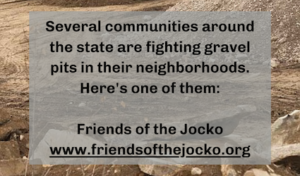If the speed of permitting is the only metric by which to measure success, then the opencut mining program is a huge success. Unfortunately, the permitting of these mines is so fast that the public is left out of the process. Even worse, that seems to suit the Montana Department of Environmental Quality (DEQ) just fine. In a recent presentation to the Legislative Environmental Quality Council (EQC), DEQ focused on how quickly it is issuing permits under the law passed by the 2021 Legislature, instead of elevating the concerns of those who live next to proposed mining operations.
The new law allows DEQ to issue a permit without notifying nearby landowners. It also eliminates the DEQ’s obligation to consider water and air quality issues when issuing an opencut mine permit. When debating the bill in 2021, the Legislature erroneously believed that DEQ’s water quality and air quality programs would allow public comments on a mine’s water and air quality impacts. It didn’t help that DEQ failed to tell the Legislature that most of the water and air permits for these facilities are called “general” permits, meaning there is no public comment period for individual mines and no site-specific analysis of the mine’s impacts. Mine developers just sign a form saying they will comply with generic requirements and they receive the “general” air or water permit. Neighbors are left with nowhere to go to raise their site-specific concerns.
DEQ had an opportunity to raise these concerns during the last session but failed to do so, instead telling the Legislature that the proposed law struck a good balance. It had another opportunity to represent the public’s concerns before the EQC and instead focused on how quickly it is issuing permits. Now, it has the ability to alleviate many of the public’s concerns by writing rules that guarantee the constitutionally-protected rights to know what is being proposed, to participate in the permitting process and raise site-specific concerns about water and air impacts, and to a clean and healthful environment. Instead, DEQ is writing rules that make the problem even worse.
At a hearing on DEQ’s proposed rules in August, people from Arlee, Libby, Paradise Valley, Bitterroot Valley, Helena Valley, and the Billings area spoke up to oppose the rule. Not a single person spoke in favor of the rules. Communities from across the state complained that DEQ was “knee-capping” the public by making it impossible to protect their communities, “aiding and abetting” violations of Montana’s Constitution, “putting lipstick on a pig,” and ignoring its mission to protect water and air quality.
Instead of listening to the public’s concerns, members of the public were repeatedly chastised by the hearings examiner for being off-topic, even though they were just respectfully asking DEQ to do its job. The DEQ needs to: ensure the public is notified of mining proposals; require meaningful public comment periods on air and water permits; respond to public comments; require the concurrent submittal of opencut, air and water permit applications; prohibit changes to post-mining land uses, reclamation dates, or permit amendments without public notification and participation; and fully comply with the Montana Environmental Policy Act on each permit application.
The only thing that is certain is that the state is going to land in court defending an unconstitutional law and DEQ’s fast track permitting, because the public will have no other recourse in its desire to protect their air, land, water and communities from large opencut mines.
This article was published in the September 2022 issue of Down To Earth.


